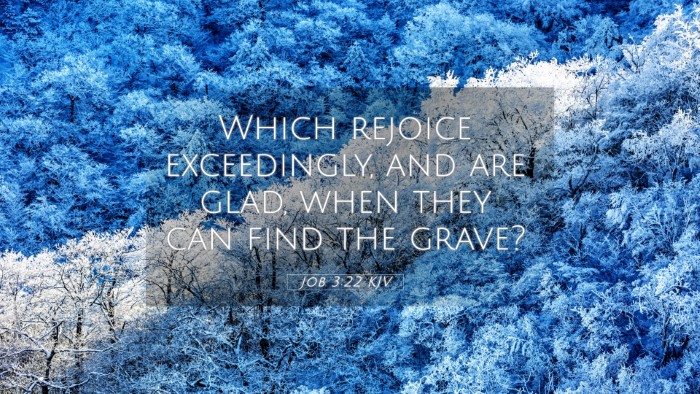Old Testament
Genesis Exodus Leviticus Numbers Deuteronomy Joshua Judges Ruth 1 Samuel 2 Samuel 1 Kings 2 Kings 1 Chronicles 2 Chronicles Ezra Nehemiah Esther Job Psalms Proverbs Ecclesiastes Song of Solomon Isaiah Jeremiah Lamentations Ezekiel Daniel Hosea Joel Amos Obadiah Jonah Micah Nahum Habakkuk Zephaniah Haggai Zechariah MalachiJob 3:22 Similar Verses
Job 3:22 Cross References
Which rejoice exceedingly, and are glad, when they can find the grave?
Uncover the Rich Themes and Topics of This Bible Verse
Listed below are the Bible themes associated with Job 3:22. We invite you to explore each theme to gain deeper insights into the Scriptures.
Job 3:22 Cross Reference Verses
No cross reference images were found in our system for this Bible passage.
Job 3:22 Verse Analysis and Similar Verses
Understanding Job 3:22
Job 3:22: "Who rejoice exceedingly, and are glad, when they can find the grave?"
This verse presents a poignant reflection on despair, longing for relief from suffering, and the profound desire for death as an escape from pain. Job, in his lament, articulates a sentiment many can identify with—the wish for peace in the grave amidst overwhelming anguish.
Meaning and Insights from Commentaries
Matthew Henry Commentary
Matthew Henry highlights that Job, in this cry, reveals the depths of human sorrow. The verse reflects the mindset of those who are overwhelmed with grief and cannot see beyond their current afflictions. Job speaks of those who 'rejoice exceedingly' because they perceive death as a form of liberation. Henry emphasizes that this sentiment is natural in the face of unrelenting suffering.
Albert Barnes Commentary
Albert Barnes offers a deeper analysis of this passage, considering the juxtaposition of joy and despair in human experience. He points out that Job's words indicate a stark contrast between the living and the dead. Barnes notes that for some, death is a welcome release from life's trials and tribulations. This perspective invites readers to reflect on the value of life itself and why death might be viewed as preferable by those in anguish.
Adam Clarke Commentary
Adam Clarke examines the poetic structure of Job’s lamentation. He emphasizes that the emotional intensity in Job 3:22 signifies a universal longing for relief from suffering, suggesting that this is a common human experience. Clarke suggests that this verse encapsulates the desire for the cessation of pain and argues that the grave represents a finality that brings peace as opposed to the turmoil of earthly life.
Cross-References and Thematic Connections
Job 3:22 illustrates themes of suffering and the quest for peace that resonate throughout the Bible. Below are several verses that relate to these themes:
- Psalms 39:13: "O spare me, that I may recover strength, before I go hence, and be no more." – Expresses a similar yearning for relief from suffering.
- Psalms 116:15: "Precious in the sight of the Lord is the death of his saints." – Highlights the value of death in the context of divine perspective.
- Ecclesiastes 7:1: "A good name is better than precious ointment; and the day of death than the day of one's birth." – Suggests that death can be seen more favorably than life.
- Isaiah 57:1-2: "The righteous perisheth, and no man layeth it to heart...he shall enter into peace." – Connects the idea of dying as a transition to peace.
- Matthew 5:4: "Blessed are they that mourn: for they shall be comforted." – Indicates that mourning is acknowledged and addressed in the life of the faithful.
- Philippians 1:21: "For to me to live is Christ, and to die is gain." – Paul reflects on the benefits of death in relation to eternal life.
- Revelation 14:13: "Blessed are the dead which die in the Lord." – Reinforces the notion of death as a blessed state for believers.
Thematic Bible Verse Connections
The despair expressed in Job 3:22 resonates with many other verses in the Bible, providing a rich tapestry for comparative analysis:
- The value of life vs. the peace in death: Explore the contrast presented in Job's lament compared to the hope found in passages like Romans 8:18.
- Mourning and comfort: Connect Job's sorrow to the teachings of Jesus regarding mourning in Matthew 5:4.
- Redemption through suffering: Analyze how themes in Job relate to the concept of suffering leading to eventual hope, found in 2 Corinthians 1:3-4.
Tools for Bible Cross-Referencing
Understanding the interconnectedness of scripture can enhance study and reflection. Here are some tools and methods for effective Bible cross-referencing:
- Bible Concordance: An essential tool for finding keywords and references across scriptures.
- Cross-Reference Bible Study Guides: Use guides that list related verses, facilitating deeper connections.
- Bible Chain References: A method that allows readers to link passages thematically or by subject matter.
- Comparative Study of Epistles: Examine Paul’s letters for themes of suffering and redemption.
Conclusion
Job 3:22 is a powerful reminder of the human condition, revealing both the sorrowful depths of despair and the glimmering hope found in divine promise. By utilizing cross-referencing methods, readers can immerse themselves in the broader biblical narrative, discovering the themes of life, death, and comfort intertwined throughout scripture.


